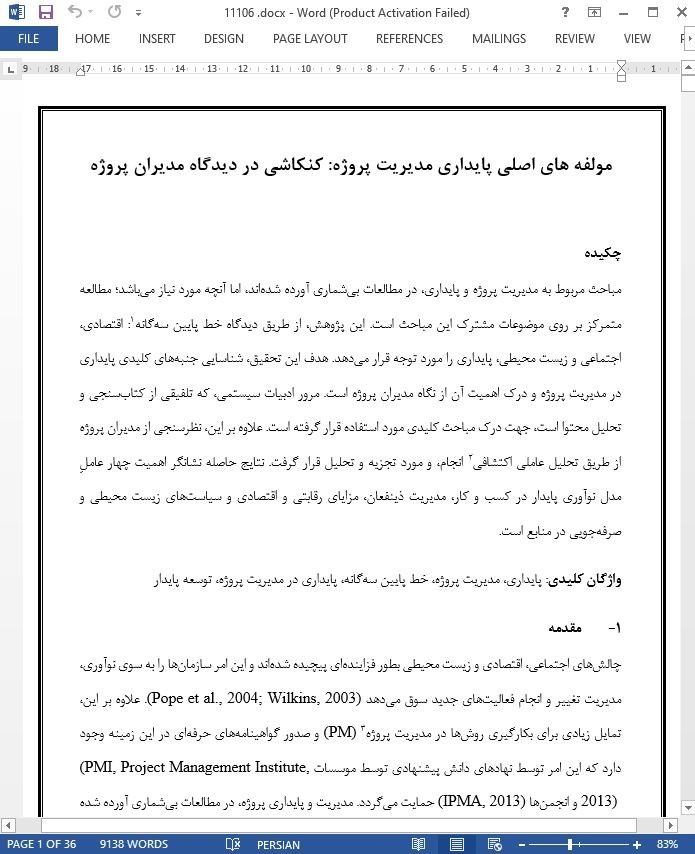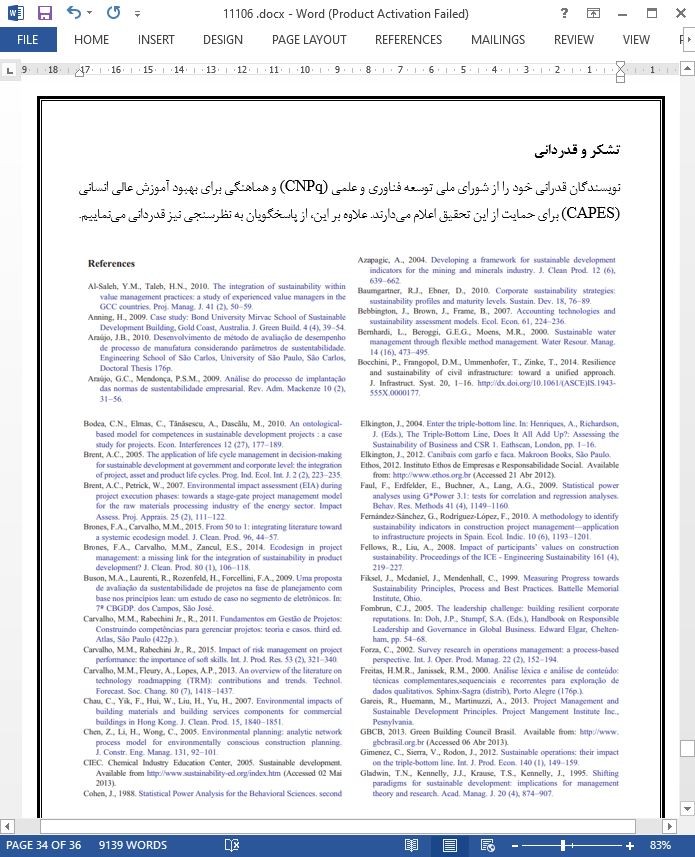
مولفه های اصلی پایداری مدیریت پروژه: کنکاشی در دیدگاه مدیران پروژه
چکیده
مباحث مربوط به مدیریت پروژه و پایداری، در مطالعات بیشماری آورده شدهاند، اما آنچه مورد نیاز میباشد؛ مطالعه متمرکز بر روی موضوعات مشترک این مباحث است. این پژوهش، از طریق دیدگاه خط پایین سهگانه : اقتصادی، اجتماعی و زیست محیطی، پایداری را مورد توجه قرار میدهد. هدف این تحقیق، شناسایی جنبههای کلیدی پایداری در مدیریت پروژه و درک اهمیت آن از نگاه مدیران پروژه است. مرور ادبیات سیستمی، که تلفیقی از کتابسنجی و تحلیل محتوا است، جهت درک مباحث کلیدی مورد استفاده قرار گرفته است. علاوه بر این، نظرسنجی از مدیران پروژه از طریق تحلیل عاملی اکتشافی انجام، و مورد تجزیه و تحلیل قرار گرفت. نتایج حاصله نشانگر اهمیت چهار عاملِ مدل نوآوری پایدار در کسب و کار، مدیریت ذینفعان، مزایای رقابتی و اقتصادی و سیاستهای زیست محیطی و صرفهجویی در منابع است.
1- مقدمه
چالشهای اجتماعی، اقتصادی و زیست محیطی بطور فزایندهای پیچیده شدهاند و این امر سازمانها را به سوی نوآوری، مدیریت تغییر و انجام فعالیتهای جدید سوق میدهد (Pope et al., 2004; Wilkins, 2003). علاوه بر این، تمایل زیادی برای بکارگیری روشها در مدیریت پروژه (PM) و صدور گواهینامههای حرفهای در این زمینه وجود دارد که این امر توسط نهادهای دانش پیشنهادی توسط موسسات(PMI, Project Management Institute, 2013) و انجمنها (IPMA, 2013) حمایت میگردد. مدیریت و پایداری پروژه، در مطالعات بیشماری آورده شده است، اما موضوعات مشترک میان این دو حوزه در کمتر تحقیقی مورد توجه قرار گرفته است. با توجه به نظر گیمنز و همکاران (2012) و کلیندورفر و همکاران (2005)، پایداری وظایف اجتماعی، زیست محیطی و اقتصادی را در هم میآمیزد تا بدین وسیله روشی منطقی جهت مصرف منابع موجود را ایجاد کند و زندگی طبیعی را برای نسلهای آینده فراهم آورد.
6- ملاحظات نهایی
این پژوهش با بررسی شکاف در پایداری و مدیریت پروژه به ادبیات تحقیق کمک کرد. این مقاله متون مربوطه و ساختاریافته در متغیرهای کلیدی را شناسایی کرده است. همانطور که سینگ و همکاران (2012) و ولش (2005) عنوان کردند، فضای زیادی برای تحقیقات بیشتر در حوزه پایداری در مدیریت پروژه وجود دارد. این بررسی همچنین نشان داد که در سالهای اخیر، تعداد نشریات با موضوع مورد بحث افزایش یافته اما در حوزههای مختلف پراکنده باقی مانده است.
این مطالعه از نظر نظری، براساس ادبیات موجود، خلاصهای از متغیرهای کلیدی را ارائه میدهد (جدول 1، 2 و 3) که بینش اولیه را در پیوند با پایداری و مدیریت پروژه برای توسعه تجربی پس از آن ایجاد میکند. علاوه بر این، ما دیدگاه مدیران پروژه این متغیرها را از طریق پژوهش مبتنی بر بررسی را دریافتیم. در نتیجه، چهار مولفهای که پایداری در مدیریت پروژه را از دیدگاه مدیران پروژه تشریح میکنند را برجسته میکنند: مدل نوآوری پایدار در کسب وکار، مدیریت ذینفعان، اقتصاد و مزیت رقابتی و سیاستهای زیست محیطی و صرفه جویی در منابع. این چهار مولفه، نشان میدهند که دیدگاه راهبردی پایداری در TBL مدیریت پروژه به گونهای که در مولفههای گروهبندی شده نامگذاری شدهاند، مشخص میشوند.
Abstract
Topics of project management and sustainability have been addressed by countless studies, but research focusing on the intersection of these topics are needed. This research looks at sustainability through the triple-bottom line perspective: economic, social, and environmental. It aims to identify key aspects of sustainability in project management context and to understand its importance based on project managers' lens. A systematic literature review merging bibliometric and content analysis was applied toward an understanding of the key topics. Further, a survey of project managers was performed and analyzed through exploratory factor analysis. The results show that four factors stood out: Sustainable Innovation Business Model, Stakeholders Management, Economic and Competitive Advantage, and Environmental Policies and Resources Saving.
1. Introduction
Social, economic, and environmental challenges have become increasingly complex, forcing organizations to innovate, manage change, and adopt new activities (Pope et al., 2004; Wilkins, 2003). In addition of this fact, there is an increasing interest in using practices in project management (PM) and certifying professionals in this field, supported by bodies of knowledge proposed by the institute (PMI, Project Management Institute, 2013) and associations (IPMA, 2013). Project management and sustainability have been addressed by countless studies, but the intersection between these two fields is still rarefied with just a few studies that have focused on both topics. According to Gimenez et al. (2012) and Kleindorfer et al. (2005), sustainability integrates social, environmental, and economic responsibility in order to create a rational use of present resources and to offer normal life for future generations.
6. Final considerations
This study contributes to the literature by exploring the gap in sustainability and project management. This paper identified relevant literature and structured it in the key variables. As suggested by Singh et al. (2012) and Welsch (2005), there is a large amount of room for additional research in the area of sustainability in project management. This study also revealed that, in recent years, the number of publications about the research topic have grown but remain dispersed across different fields.
As a theoretical contribution, this study provided a summary of key variables according to the extant literature (Tables 1, 2, and 3) that provide initial insights at the nexus of sustainability and project management for subsequent empirical development. Moreover, we explore the project managers' perspective of these variables through a survey-based research. As a result, four factors stood out that explain sustainability in project management in the project managers’ perspective: Sustainable Innovation Business Model, Stakeholders Management, Economics and Competitive Advantage, and Environmental policies and resources saving. The four factors also show that the strategic perspective of TBL sustainability in project management is relevant as named in the grouped factors.
چکیده
1- مقدمه
2- مروری بر ادبیات تحقیق
1-2- پایداری، توسعه پایدار و مسئولیت اجتماعی شرکتها
2-2- پایداری در مدیریت پروژه
3-2- رویکرد پایداری و مدیریت پروژه
3- روش تحقیق
3-1- مرور ادبیات سیستمی (SLR) و طراحی ابزار پژوهش
3-2- پژوهش مبتنی بر نظرسنجی: نمونهگیری و تجزیه و تحلیل داده
4- مولفههای کلیدی پایداری در مدیریت پروژه
1-4- جامعه نمونه
4-2- تحلیل عاملی
5- بحث و نتایج
6- ملاحظات نهایی
Abstract
1. Introduction
2. Literature review
2.1. Sustainability, sustainable development, and corporate social responsibility
2.2. Sustainability in project management
2.3. Approaching sustainability and project management
3. Research methods
3.1. The systematic literature review (SLR) and research instrument design
3.2. The survey-based research: Sampling and data analysis
4. Key factors for sustainability in project management
4.1. Sample demographics
4.2. Factor analysis
5. Discussion of the results
6. Final considerations
- اصل مقاله انگلیسی با فرمت ورد (word) با قابلیت ویرایش
- ترجمه فارسی مقاله با فرمت ورد (word) با قابلیت ویرایش، بدون آرم سایت ای ترجمه
- ترجمه فارسی مقاله با فرمت pdf، بدون آرم سایت ای ترجمه



